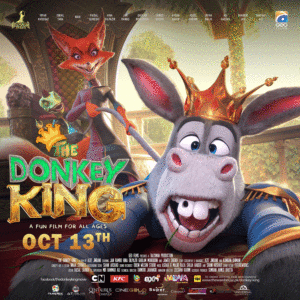Movie review: Donkey King
By Zoha Liaquat | Movies | Published 7 years ago
 For a movie claiming to be apolitical, The Donkey King draws most of its inspiration from the current political landscape of the country, taking some not-so-subtle digs at key players across the board.
For a movie claiming to be apolitical, The Donkey King draws most of its inspiration from the current political landscape of the country, taking some not-so-subtle digs at key players across the board.
Mangu (Jan Rambo) is a lovable donkey who lives in Azadnagar with his uncle. Not the brightest bulb in the box, Mangu’s aspirations in life are limited to finding love – he often dreams of a woman while a song plays in the background. Living an entirely different life is the King’s son Shahzada Khan (Adeel Hashmi), who spends his days pouting for selfies. Their worlds collide when Mangu accidentally burns a hole in the prince’s robes while ironing them. Refusing to drop the clothes off at the palace gates, Mangu insists on delivering them to the prince himself and manages to convince Shahzada Khan that the hole in his robe is, in fact, a fashion statement.
Shahzada Khan’s father and Azadnagar’s King, Badshah Khan (Ghulam Mohiuddin), prepares to name his son the next king of the land, when his advisor Ms. Fitna (Hina Dilpazeer) suggests they introduce democracy in the realm. Averse to the idea at first, Badshah Khan is left with no choice but to give in after his announcement of making Shahzada Khan the next king is met with hostility and protests from the general public. Successful in tricking the king, Ms. Fitna colludes with the local media, and revamps Mangu’s image as that of the people’s saviour. Happy to see someone among them rising through the ranks, Azadnagar’s animals turn out in huge numbers to vote for Mangu, choosing him as their new leader. But Azadnagar’s problems are far from over; what follows is an adventurous ride of multiple twists and turns as Mangu navigates through the challenges his new role entails.
Although The Donkey King claims to be a ‘film for all ages,’ the children will have a hard time unravelling the plot that delves into the complexities of power play in politics. As the film examines the role of the media in shaping public perception, and shows a masked figure calling the shots, one cannot help but draw a comparison to the political commentary surrounding the recent elections in the country. Shahzada Khan as the heir of a political dynasty is all too reminiscent of Bilawal Bhutto; a scene in the film shows him delivering a speech before the media, and getting corrected on his improper usage of an Urdu phrase. In another instance, the people’s new leader Mangu is referred to as a ‘Tsunami’ – the far-from-subtle political reference is very hard to miss.
The film’s tongue-in-cheek humour lacks punch, and is tone-deaf in places. From Mangu’s uncle’s exaggerated Sindhi accent, to the over-the-top gestures of transgender characters as they sing for a contest, the jokes are insensitive and feed into stereotypes. A scene between Mangu and his father bears a striking resemblance to the iconic scene from The Lion King where Mufasa reminds Simba of his duty to the people of Pride Rock.
The animation of the film, though commendable, is let down by its writing and pacing. The first half is painfully long, with unnecessary songs and chase sequences that do not add to the narrative. From Kaun Banega Crorepati to Indian Idol, the film takes more than just inspiration from shows across the border. Smaller characters based on celebrities like Shahrukh Khan, Amitabh Bachchan and Donald Trump make an appearance – a testament to the lack of originality on the writer’s part.
Along with the quality of animation, the film’s only other redeeming feature is the acting. Hina Dilpazeer as Ms. Fitna, the cunning advisor to the throne is a delight to watch, and Jan Rambo’s endearing portrayal of Mangu makes it hard not to root for the Donkey King.
A journalism graduate, Zoha's core areas of interest include human and gender rights issues, alongside which she also writes about gender representation in the media and its impact on society.


